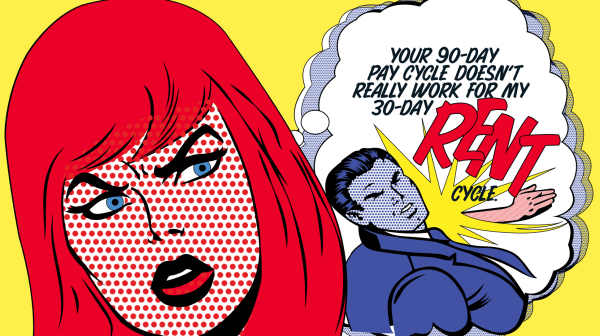The internet offers freelancers many things, from tools with which to do their work through to sites that help them find that work. It also helps them to come together as a community, and never more so than this week. The international freelance community has been in full voice over the last few days, initially celebrating the ‘Freelance Isn’t Free Act’ in New York City, and again towards the end of the week as #NoFreeWork went viral on UK Twitter feeds.
‘Freelance Isn’t Free Act’
Technology brings rapid change, and with it real head-scratchers. Both the so-called ‘gig economy’ and the ‘sharing economy’, equally indebted to web-based developments, are under real scrutiny at the moment. Last week, Uber – often held up as the most successful example of this working model – was ruled against in a court of law, forcing a change in their policies that will see them having to pay their drivers the minimal wage.
Elsewhere, Airbnb – commonly placed on a similar pedestal – are facing a backlash based on evidence that more and more people are signing up as landlords and forcing up local rents.
Freelancers might associate themselves more with the gig economy, taking work where it is offered, more often than not through connections made online. And while this has made the gigging life a more connected ride, you’d be hard pressed finding a freelancer who hasn’t fallen foul of it in some way or another.
Technology makes us reachable at any time of the day, meaning that employers can drop their employees a line whenever they feel like it. “Could you just…” – three little words that can destroy an evening, hamper a weekend and generally breed bad feeling between both sides.
Contracts are ignored as the diligent freelancer fears they may be dropped for someone less fussy. Payments get later and later, and may even stop altogether. Promises of equity in startups come to nothing. The list goes on and on.
“Could you just…” – three little words that can destroy an evening or hamper a weekend
So it’s easy to see why the freelance communities on both sides of the pond celebrated last week’s ‘Freelance Isn’t Free Act’, which came into effect in New York City on October 27th, 2016. New York is the first American city to take this route, prompted by the fact that 38% of its inhabitants are now freelance workers. Passed with 51 votes, this historic bill ensures:
- Written contracts for all freelancers
- Rights for freelancers to file complaints against late-paying and non-paying employers
- Penalties against employers repeatedly failing to pay on time or at all
To view the full legislation, click on: Freelance Isn’t Free Act.
UK respond with #NoFreeWork
In late October, the UK’s Freelancer Club launched a survey to find out how often freelancers in this county are asked or expected to do unpaid work. The results were startling, and prompted a Twitter outcry, hashtagged #NoFreeWork.
As the infographic above shows, the most unnerving statistics included the facts that:
- On average, the average UK freelancer completes 31 days of free work every two years
- 40% found themselves without money to cover basic costs of living
- 40% were expected to compete with other freelancers who were willing to work for free
- On average, the freelancers having to work for free had been specialists in their area for 7 years
- 67% of these exploited freelancers were women
Inevitably, the news moved community members enough to turn to their social media accounts in creative protest.
The Freelance Club are currently calling for the UK’s gig economy community to sign their No Free Work Petition, and agree to adhere to its code of conduct. While it may not be as legally-binding as New York’s Freelance Isn’t Free Act, it will at least make people aware of what’s going on, whether they’re employees abusing the system or potential freelancers considering their next career move.
For more on living the freelance life in the UK, why not follow us via our Facebook and Twitter pages? We look forward to see you over there.


